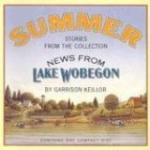CHAPTER V.
Sunday in the Country—Proximity of a Meeting-house—How we pass our Sundays—The House in the Woods—Ida’s Glen—Mrs. Greeley’s Favorite Spring—The Children’s Play-house—Gabrielle’s Pets—Travelling in 1836—New York Society—Mr. Greeley’s Friday Evenings—Mrs. Greeley as a Bride—Her Accomplishments—A Letter concerning Mr. Greeley’s Wedding.
June 16.
Sunday is, I think, a very triste day in the country (low be it spoken). I cannot remain longer than an hour at church, for the Mass is a low one, and the sermon consists of fifteen minutes of plain, practical instruction, unembellished by rhetoric, to the congregation. The church, it is true, is four miles distant, but Gabrielle’s aristocratic ponies, Lady Alice and The Duchess, fairly fly over the ground—up or down hill, it is immaterial to them—and consequently, I find myself, when my religious duties are over, with many idle hours upon my hands.
The croquet balls and mallets, our “Magic Rings,” and other out-of-door games, are put away in the “children’s play-house,” a little white hut on the borders of the croquet ground, where Ida and dear little Raffie used to keep their toys, and where Gabrielle in later days housed her menagerie of pets.
The piano, too, is not only closed, but locked, for the flesh is weak, and I fear the temptation of the beautiful cold keys. It may be the baneful effect of a foreign education, but I cannot see that there would be any evil result from a little music on Sundays. However, we have a Dissenting church for a next-door neighbor, and the residents of Chappaqua are chiefly Quakers, who frown upon the piano as an ungodly instrument; so with a sigh, I replace in my portfolio that grand hymn that in 1672 saved the life of the singer, Stradella, from the assassin’s knife, and a beautiful Ave Maria, solemn and chaste in its style as though written by St. Gregory himself, but composed and dedicated to me by mamma’s friend, Professor F. L. Ritter.
My pretty bits of fancy work with their bright-colored silks, the tiny needle-book worked while in Munich in an especially pretty stitch, and in the Bavarian colors—blue and white—and my Bavarian thimble—silver and amethyst—are put away in a bureau drawer, for although a Catholic, I do not imitate our Lutheran maid, who spends her Sundays in sewing and knitting.
Plato and Kohlrausch, our week-day sustenance, do not come certainly under the head of Sunday reading, although I see nothing objectionable in them; but after all, one requires, I think, a change of literature on Sundays as well as a different dress, and an extra course at dinner.
“What shall we do?” says Gabrielle.
We have each written a letter or two, for Sunday is, I am sure, every one’s letter-writing day, and now we put on our broad-brimmed garden hats, with their graceful trimmings of gauze and crape, and stroll off to the spicy pine grove, where we sit down on the dry spines, and Arthur repeats to us quaint bits from some of the rare old books he read in the British Museum three years ago, or entertains us with some of his own adventures when travelling on foot over beautiful France and Italy, and “Merrie England.”




